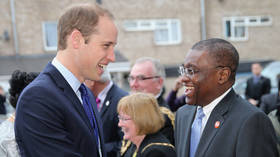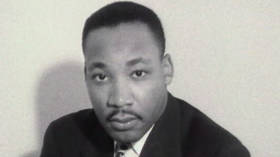53 years after MLK’s death, George Floyd may not be the ‘perfect’ martyr… but his impact on society could be more profound
The anniversary of Martin Luther King’s killing has brought the trial of Derek Chauvin into even sharper focus. While George Floyd was clearly a flawed character, his legacy may prove even more important than MLK’s.
Call it coincidence. Call it poor scheduling. Call it a gift from God. Any way you look at it, the timing of Derek Chauvin’s trial for the murder of George Floyd couldn’t be better, given its powder keg symbolism.
As the courtroom drama surrounding former police officer Chauvin enters its second week, the city of Minneapolis – where Floyd died on May 25, 2020, under the 19-year veteran’s knee – along with America at large and the Afrocentric diaspora, continues to hold its breath on the outcome of one of the most eagerly awaited trials in recent times.
Even by America’s standards, where the killing of black men by the state, each other, paranoid whites and a raft of preventable diseases operates on an industrial scale, the manner in which 46-year-old Mr Floyd was allegedly snuffed out by 45-year-old Chauvin is truly shocking.
I’ve watched some gruesome spectacles in my time on video, from terrorist bombings, to atrocious war crimes, to cold-blooded extrajudicial killings. Such is the life of a hack. But ‘experiencing’ the nine-minute, 29-second slow death of George Floyd, on camera, as police officers stood by without intervention, was grotesque beyond belief. I’ve seen cops pay more interest redirecting traffic than that given by Chauvin’s colleagues for Mr Floyd’s life.
Facing a possible 40 years in jail if convicted of second-degree unintentional murder, 25 years for third-degree murder and 10 years for second-degree manslaughter charges, for the next few weeks, Derek Chauvin will be looking at his jury of eight white, four black and two mixed race peers and praying for mercy. Whether they exact justice, or the streets of Minneapolis deliver their verdict with ‘eye for an eye’ retribution as they did during last summer’s tumult, is yet to be seen.
Last year, George Floyd and Black Lives Matter-inspired demonstrations demanding an end to state-sanctioned racism and police reform were held in over 400 cities across the US; countless other locations in the diaspora quickly followed suit with similar demands. If BLM needed a poster boy to elevate it from being just another ‘radical’ African American organisation to a global rights-based movement, it found it in George Perry Floyd Jr.
Today, the symbolic stakes have never been higher, not just for the US, but beyond. The American criminal justice system needs a metaphorical ‘win’ almost as much as the black diaspora does. As American metaphors go, the nine minutes and 26 seconds it took for Floyd to die under Chauvin’s knee might only have looked worse had he been under the white ex-cop’s grubby boot – or on the end of a rope.
The message in the video that serves as George Floyd’s death mask, coming as it does against a cultural backdrop in which white mass murderers, serial killers, ‘domestic’ terrorists and sundry psychopaths are arrested non-violently is clear: When it comes to the white hegemony, black lives don’t matter one jot. However, as amped up confrontations between lockdown-weary and increasingly angry populations around the world illustrate, whether it’s institutionalised racism or structural equality of any description, the largely non-violent approach of passive resistance, popularised by Gandhi and then Martin Luther King Jr, is once again starting to wear thin. And when that happens, something has to give.
While MLK rightly won plaudits, including a Nobel Peace Prize, his approach came at the ultimate cost. Fifty-three years ago to the day, this week, one of the greatest civil rights movements of the modern era faced the reality of white America’s contempt for its black cousinship when a shot rang out in the Memphis sky. On April 4, 1968, as King stood on the second-floor balcony of the Lorraine Motel, career criminal James Earl Ray hunkered down in a rooming house across the street and fired a single shot from a Remington rifle, fatally wounding the civil rights icon.
Also on rt.com Hollywood is finally asking questions about the FBI. Maybe now we’ll get some answers about Malcolm X, MLK and othersIn many respects, Ray and Chauvin, and separately King and Floyd, have much in common – aside from the obvious. Like Chauvin, Ray never graduated high school, spent an unremarkable time in the US military and came from a provincial, ‘flyover’ part of the States before dedicating much of his life to lawbreaking, albeit from the other side of the criminal divide. On the other hand, King’s death, like Floyd’s, gave rise to sustained civil unrest during the ‘Holy Week Uprising’ – one of America’s biggest, and most violent post-Civil War demonstrations, with rioting in some 110 cities, the worst hit being Washington D.C., Baltimore, Chicago and Kansas City – all of which led to the deployment of the National Guard in several states with dozens of people reportedly killed.
Both King and Floyd were also complicated, flawed individuals, in their own ways. But then, who isn’t? In 2019, an explosive essay by King biographer David Garrow, published in Standpoint magazine, peddled a serious, unfounded allegation that Dr King may have witnessed and encouraged a rape, aside from having several extramarital affairs – material based on highly questionable FBI ‘intel’. Bearing in mind that the FBI once described King as “the most dangerous black man in America” and suggested he “must be destroyed at all costs,” one should look on such state-sponsored intelligence at best with deep scepticism and at worst as part of a wider calculated smear.
Questioning the veracity of the allegations in the New York Times, Dr Barbara Ransby, a fellow of the Society of American Historians, and John D. MacArthur, Chair at the University of Illinois at Chicago, had this to say about Garrow’s piece of work: “As a black feminist and a civil rights historian, I do not need to be persuaded that many black male ministers during the civil rights era were morally duplicitous, felt sexually entitled and slept around. So, did many Catholic priests, politicians, Hollywood celebrities and some award-winning male academics.” Dr Ransby added, “The lurid and gratuitous sexual narratives that Mr Garrow recounts from F.B.I. edited summaries are reminiscent of the racist manner in which black sexuality has been described historically.”
Within hours of George Floyd’s death, the smear campaign against his legacy, and by association, BLM, had started in earnest. But fake news, salacious memes and police propaganda notwithstanding, there was enough dirt, on the record, including aggravated robbery with a deadly weapon for which he received a five-year prison sentence, to cast Floyd in a very negative light. Bizarrely, a day after George’s death, I received a WhatsApp message from an acquaintance which included a link to an adult site featuring Floyd in a porn movie.
Not one to miss an opportunity to lay into black America, conservative commentator Candace Owens soon released a video claiming Floyd was high on crystal meth when he was arrested. “Everyone is pretending that this man lived a heroic lifestyle,” she ranted. “We [African Americans] are embarrassing... Nobody wants to tell the truth in Black America. Our biggest problem is us. I have no apologies to make. George Floyd is not my martyr. He can be yours.”
As fact-checking website Snopes has pointed out, not all of Ms Owens’ claims about Mr Floyd stand up to scrutiny. But just as the Feds sought to rubbish MLK’s legacy, Owens’ attack on George Floyd’s character raises the question: What makes for a modern-day martyr? Regardless of paths chosen, who are we to judge if someone makes the ultimate sacrifice for the greater good?
Back in August 2011, the same questions were being asked as Britain went up in flames following the police shooting of 29-year-old Mark Duggan in Tottenham, North London. A known criminal and suspected of being in possession of a firearm, Duggan was shot dead by police in a ‘planned operation’ designed to relieve him of said weapon. Some 48 hours after his shooting, an angry crowd gathered outside Tottenham police station, and with tensions between the local black community and local police going back decades, frustration turned to violence, rioting and looting which lasted several days and spread to other parts of the country, resulting in the deaths of five people, over 3,000 arrests and an estimated £200 million in damage.
On paper, Duggan, like George Floyd, is far from classic martyr material. But while the former’s death led to an anti-police and anti-statist rebellion, the latter’s, despite being tainted by scattered outbreaks of violence, has catalysed a groundbreaking, ‘global movement for change’ of which BLM is but the latest and just one component in a struggle going back centuries. Martyrs, like prophets, come in all shapes and sizes. It’s not the content of their character we need judge; what matters most is the impact of their legacy.
In a week where the British government is reeling from the aftershock of its publication of a 258-page report by its Commission on Race and Ethnic Disparities, a report that has been widely condemned as a ‘blackwashing’ exercise designed to absolve the British state of any culpability concerning racism, while pandering to a growing white underclass, Prime Minister Boris Johnson would do well to heed the words of his namesake and former US president, Lyndon B Johnson, who spoke during the Holy Week Uprising.
“What did you expect? I don’t know why we’re so surprised. When you put your foot on a man’s neck and hold him down for three hundred years, and then you let him up, what’s he going to do? He’s going to knock your block off.”
Think your friends would be interested? Share this story!
The statements, views and opinions expressed in this column are solely those of the author and do not necessarily represent those of RT.















